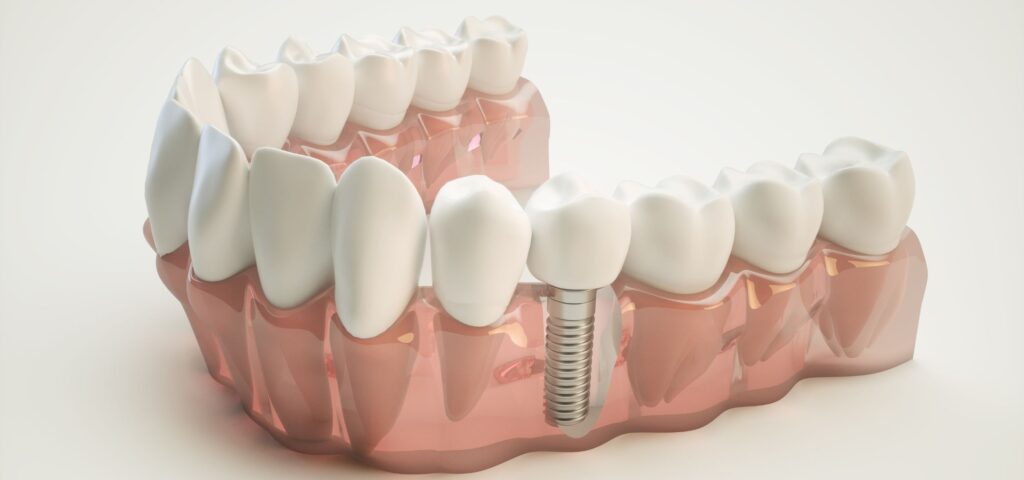Dental implants are substitute tooth roots that replace natural tooth roots in areas where teeth are missing. The most common type of dental implants is root-form implants, made of surgical grade titanium compounds that have been proven to be safe and have no known allergies.
Dental implants allow the replacement of the entire missing tooth, which was never before possible. Implant-supported replacement teeth look, feel, and function like natural teeth, providing patients with a long-term solution to missing teeth.


One of the critical advantages of dental implants is their ability to preserve bone. Natural tooth roots preserve the bone, and when teeth are missing, the bone that previously supported those teeth melts away or deteriorates, a process called bone resorption. The impact of deteriorating bone from complete tooth loss includes collapsed facial profiles, lost lip support, increased wrinkles around the mouth, and the appearance of a pointed nose and chin that are too close together.
Dental implants can preserve the bone by replacing missing tooth roots. The bone forms a strong bond to the implants, and they can serve the same functions as natural tooth roots, such as a strong foundation for biting and chewing and stimulation for the bone to hold it in place.



Dental implants offer patients an aesthetically pleasing and functional solution to missing teeth, allowing them to enjoy a confident smile and improved quality of life. Not only do they replace missing teeth, but they also help preserve the jawbone and prevent further bone loss.
With proper care and maintenance, dental implants can last a lifetime and provide a permanent solution to missing teeth. If you are missing teeth and considering dental implants, contact us to learn more about the procedure and how it can benefit you. They can evaluate your oral health and determine if dental implants are the right choice for you.



Dental implants offer patients an aesthetically pleasing and functional solution to missing teeth, allowing them to enjoy a confident smile and improved quality of life. Not only do they replace missing teeth, but they also help preserve the jawbone and prevent further bone loss.
With proper care and maintenance, dental implants can last a lifetime and provide a permanent solution to missing teeth. If you are missing teeth and considering dental implants, contact us to learn more about the procedure and how it can benefit you. They can evaluate your oral health and determine if dental implants are the right choice for you.
There are actually two phases to implant dentistry:
Usually, discomfort is not a problem. You will be given appropriate medications during and after the procedure. We urge you to ask other patients how they felt after implant therapy.
Dr. Liang enlists the assistance of a cohesive group of dental professionals, specifically trained to handle advanced implant dentistry needs as well as provide the most comfortable dental visit for our patients. Based on our vision of continued quality improvement, we are proud of the restorative and maintenance results that we can achieve for our patients. Although we continue to grow, the personal touches that make us successful have not changed.




Dr. Liang, Diplomate, American Board of Oral Implantology, attended the University of British Columbia and received his Bachelor's degree in Microbiology in 1981 and his Doctor of Dental Medicine degree in 1983. At graduation, he was awarded the Canadian Oral and Maxillo-Facial Prize for highest standing in the area of Oral Surgery.




Dr. Tsang attended UBC where he studied mathematics before heading to Philadelphia to study at Temple University School of Dentistry. Dr. Tsang currently practices general dentistry in Abbotsford. He joins Dr. Liang and his team as an associate and implant dentist. As a life-long learner, he participates in hundreds of hours of continuing education each year.




Patricia graduated from UBC dental school in 1983 at the top of her class (Gold Medal winner). She has worked at the UBC dental faculty, has been on various committees with the College of Dental Surgeons, is currently the Treasurer of the CDSBC Board and has been working with the National Dental Examining Board of Canada since 1997.




After having completed numerous hours of continuing education in Prosthodontic Dentistry, he made a focus on a full mouth rehabilitation in his work. As a lifelong learner, he constantly reads periodicals and takes various dental courses to expand his knowledge and to provide high standard dental services for the community.




















We thoroughly examine your oral cavity, including teeth, gums, and surrounding tissues, to identify any issues or abnormalities.













With years of practice, our dentists have honed their skills and gained a wealth of knowledge in various dental procedures.





Our dentists are not only skilled practitioners but also mentors in prestigious dental training programs.





From routine check-ups and cleanings to advanced procedures like dental implants, our clinic is the solution for all your dental concerns.





Our dentists prioritize your comfort, aesthetics, and long-term oral health by tailoring treatment plans based on your unique needs and goals.





We prioritize easing any dental visit concerns by creating a warm, welcoming environment with friendly staff and caring dentists.





We provide you with the highest standard of care using advanced tools and techniques to ensure accurate diagnoses and effective treatments.





Our dental clinic prioritizes patient education, empowering them to make informed decisions about their oral health.





Our satisfied patients' testimonials speak volumes about the quality of care and service we provide.












Dr. Liang and his team did an amazing job removing my impacted wisdom teeth. The process was painless, and they made me feel very relaxed and comfortable. This was definitely the best dental care experience I’ve ever had, thank you!
Great friendly staff. Very helpful, informative and accommodating. Easy to find with good parking. Dental work was done without issue and good follow up. All options were discussed. Full recovery faster than I expected. Wouldn’t go anywhere else.
My wife has relied on Dr. Liang for approximately 25 years. She has had several crowns and an implant plus regular cleaning. Most recently, she had gum repair surgery. Dr. Liang is very skilled, and his staff are friendly and professional. His office uses the latest techniques and equipment. Very highly recommended.
I had my severely impacted wisdom teeth removed by Dr. Liang and the team and they did an amazing job. I healed very quickly and pain free. I cannot recommend them more.
When I stepped into the clinic, I was welcomed by a friendly staff who gave me detailed information about my appointment. People feel more at ease in the office since it is so well-kept and clean. They also have the best White Rock dentists, Dr. Liang is highly knowledgeable, incredibly friendly, and professional. He was really nice while being thorough. Definitely recommend!
Dr. Liang is a highly skilled and very kind dentist. His assistants are all professional and friendly. The whole treatment process is well organized and smoothly. My implants are very successful.
My dental implants experience with Dr. William Liang was superb! The feeling of self-worth that was given to me is priceless. The staff was amazing and very kind in helping me with my teeth implants needs. My teeth now look so natural and I can't begin to imagine that was ever possible. I can not thank Dr. William Liang enough for his professionalism. I will surely refer Smile Dental Implant Center to anyone in need of teeth implants. I will definitely return for my future dental implants soon!
Wonderful dental team. Passionate about their work. They went above and beyond to make the dental implants or teeth implants possible for me. Dr. William Liang is excellent! The assistant was so patient and compassionate too and they work so well together. We have been bragging so much about how awesome our experience was that my other 2 daughters and my sisters are coming with me to Surrey for my follow-up so they can meet everyone! I’m very very grateful and without a doubt made the right choice to have my dental implants or teeth implants done here. You will never know how much this has meant to me!!! Thank you from the bottom of my heart.
In the realm of modern dentistry, dental implants have emerged as a prominent solution for replacing missing or damaged teeth, offering an alternative to traditional
Tooth extractions are a common dental procedure. They are sometimes needed due to broken, damaged, or decayed teeth that can’t be healed. But what happens
Dental implants have revolutionized the field of dentistry, providing a reliable solution for individuals with missing teeth. However, it’s essential to recognize that not everyone
Link to This Clinical Case Report Click here to download the report. Author: Dr. William Liang, DMD One of the most challenging aspects of dental
info@implant.ca